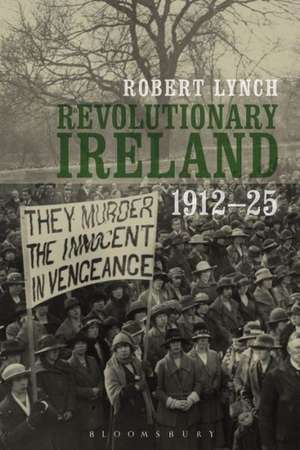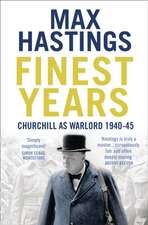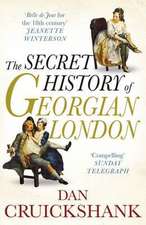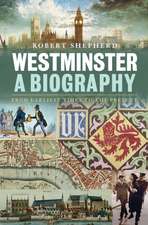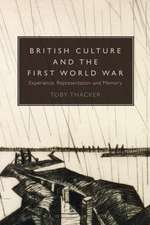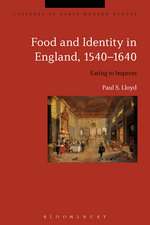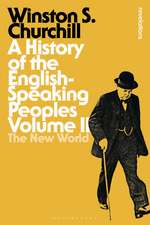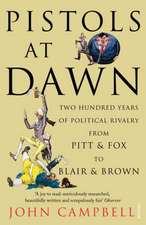Revolutionary Ireland, 1912-25
Autor Dr Robert Lynchen Limba Engleză Paperback – 28 ian 2015
Toate formatele și edițiile
| Toate formatele și edițiile | Preț | Express |
|---|---|---|
| Paperback (1) | 217.09 lei 43-57 zile | |
| Bloomsbury Publishing – 28 ian 2015 | 217.09 lei 43-57 zile | |
| Hardback (1) | 714.19 lei 43-57 zile | |
| Bloomsbury Publishing – 28 ian 2015 | 714.19 lei 43-57 zile |
Preț: 217.09 lei
Preț vechi: 244.44 lei
-11% Nou
Puncte Express: 326
Preț estimativ în valută:
41.54€ • 43.49$ • 34.37£
41.54€ • 43.49$ • 34.37£
Carte tipărită la comandă
Livrare economică 07-21 aprilie
Preluare comenzi: 021 569.72.76
Specificații
ISBN-13: 9781441158383
ISBN-10: 1441158383
Pagini: 200
Dimensiuni: 156 x 234 x 13 mm
Greutate: 0.32 kg
Editura: Bloomsbury Publishing
Colecția Bloomsbury Academic
Locul publicării:London, United Kingdom
ISBN-10: 1441158383
Pagini: 200
Dimensiuni: 156 x 234 x 13 mm
Greutate: 0.32 kg
Editura: Bloomsbury Publishing
Colecția Bloomsbury Academic
Locul publicării:London, United Kingdom
Caracteristici
Web resource links to biographies, media news reports, speeches, statistics, parliamentary debates and official reports
Notă biografică
Robert Lynch is Research Fellow at the Institute of Irish Studies, Queen's University, Belfast, UK. He is the author of The Northern I.R.A. and the Early Years of Partition (2006).
Cuprins
Introduction: What Revolution?1. Background to the Revolution, 1890-19102. The Ulster Crisis, 1912-163. The Easter Rising4. The Rise of Sinn Fein, 1916-185. The Irish War of Independence, 1919-216. The Establishment of Northern Ireland, 1918-217. Truce and Treaty, July-December 19218. Partition in Practice, January-July 19229. The Irish Civil War, 1922-2310. Consolidating the Revolution, 1923-1925AppendixBibliographyIndex
Recenzii
His pithy text is structured in clear, digestible sections; other helpful features for students and teachers alike are sample essay/exam questions and an appendix of key documents from the period. I consequently include Lynch's even-handed textbook on my seminar reading list and recommend for others Revolutionary Ireland as a useful gateway to a fascinating, intensively researched, and still controversial decade or more in Irish history.
A book of this size and presentation boasts numerous advantages. Lynch successfully liaises utility and scholarship, making Revolutionary Ireland, 1912-25 an essential introduction to the field and an attractive choice for university seminars. Contemporary voices, including accounts from statesmen, soldiers, clergy, and common observers, bolster an already vivid text, while primary source documents allow readers to explore the essential link between historical narrative and the archival material it interprets . Overall, this book is an essential contribution to the work being produced on the revolutionary period.
Revolutionary Ireland, 1912-25 provides an excellent introduction to this vital period in Irish history for those coming to the subject for the first time, and especially for students who wish to consolidate and extend their knowledge of Irish history. Including sample exam questions, reading lists, web links and a selection of important documents from the period this book explores the political history of the 'revolutionary period' and clarifies the sequence of events leading to the 1916 Rising, the War of Independence, the creation of two new partition states, and the Civil War. The political complexities of the period are laid bare and their consequences made clear. This book reveals how both the Northern Irish State and the Irish Free State, created in violence, were defined and shaped by their experiences during the revolutionary period.
The Irish Revolution, 1912 to 1925, has in the last decades inspired a massive amount of attention from historians. Robert Lynch's beautifully written short book provides a much needed synthesis of recent literature. It is also the product of extensive work on primary sources and notable for original coverage of the north east. It places the partition of the island in an all-Ireland context in contrast to so many works written from a narrow unionist or nationalist perspective. The book's structure, its inclusion of select bibliographies and sample essay questions add to its value for students.
A book of this size and presentation boasts numerous advantages. Lynch successfully liaises utility and scholarship, making Revolutionary Ireland, 1912-25 an essential introduction to the field and an attractive choice for university seminars. Contemporary voices, including accounts from statesmen, soldiers, clergy, and common observers, bolster an already vivid text, while primary source documents allow readers to explore the essential link between historical narrative and the archival material it interprets . Overall, this book is an essential contribution to the work being produced on the revolutionary period.
Revolutionary Ireland, 1912-25 provides an excellent introduction to this vital period in Irish history for those coming to the subject for the first time, and especially for students who wish to consolidate and extend their knowledge of Irish history. Including sample exam questions, reading lists, web links and a selection of important documents from the period this book explores the political history of the 'revolutionary period' and clarifies the sequence of events leading to the 1916 Rising, the War of Independence, the creation of two new partition states, and the Civil War. The political complexities of the period are laid bare and their consequences made clear. This book reveals how both the Northern Irish State and the Irish Free State, created in violence, were defined and shaped by their experiences during the revolutionary period.
The Irish Revolution, 1912 to 1925, has in the last decades inspired a massive amount of attention from historians. Robert Lynch's beautifully written short book provides a much needed synthesis of recent literature. It is also the product of extensive work on primary sources and notable for original coverage of the north east. It places the partition of the island in an all-Ireland context in contrast to so many works written from a narrow unionist or nationalist perspective. The book's structure, its inclusion of select bibliographies and sample essay questions add to its value for students.
